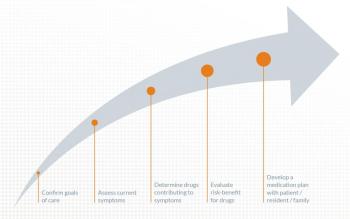Polypharmacy Risk Reduction
Taking multiple medications, or polypharmacy, is a risk factor for serious adverse events for the elderly, especially for the frail elderly. With each medication taken, the risk of confusion, falls and other negative impacts rises exponentially.
The Shared Care Polypharmacy Risk Reduction initiative aims to reduce risks of polypharmacy in the elderly, by providing physicians with practical approaches and tools for improved safety and quality of life.
Patient-Centred Clinical Approach
The patient-centred clinical approach starts with the Goals of Care of each patient. Click on the image below for the full diagram:
This initiative was implemented in phases, focusing on prescribing in the following care settings:
Long term care
This phase has now been completed. Meaningful Medication Reviews are an integral part of the General Practice Services Committee's Long Term Care Initiative (formerly the Residential Care Initiative), and sustainability and spread will be supported through that initiative.
Learn more about the Long Term Care work of each division.
Acute Care and Transition
This phase has now been completed. There were two waves that encompassed five medical units and three surgical hip fracture units at eight hospitals across BC. The goal was to learn how to reduce risk of polypharmacy from the point of a patient's admission to acute care, during their stay, and after discharge to their home or to long term care.
Community Care
Building on what was learned working with long term care and acute care settings, family physician and specialist practices can identify and implement practical polypharmacy risk reduction approaches for the elderly in the community, and as part of the developing Patient Medical Home and Primary Care Networks currently underway.
Contact
Shared Care Committee
Email: shared_care@doctorsofbc.ca


